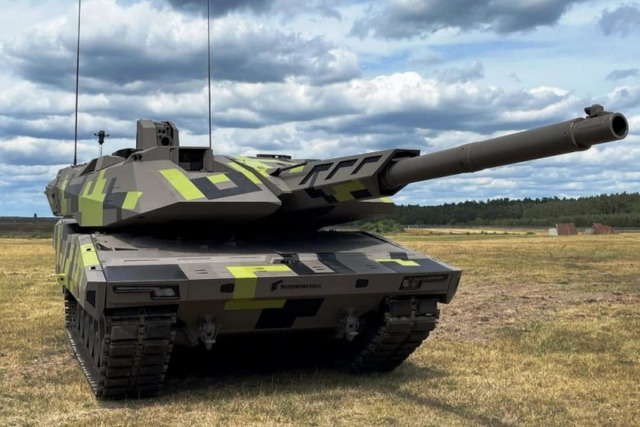We continue to publish additional materials about the new main battle tank (MBT) of the Rheinmetall concern "Panther" KF51, published during the profile forum in Berlin. We remind you that the first article of the series was an introduction to the topic, the second is devoted to the firepower of the model, the third is the protection of the combat vehicle. In this article, the head of the Rheinmetall Electronics department Christoph Meyer shares the features of the organization of electronics and information support of the tank.
Electronics and information support of OBT "Panther" KF51
According to Rheinmetall experts, mobility, firepower and protection are not enough to create a good tank. Various sensors connected to computers capable of transmitting all data to the right subsystem or to the right crew member are crucial for the mission. The commander and gunner must see potential targets not only at a great distance, they must also observe what is happening at a much closer distance around the platform, while for accurate firing from the main gun, it is necessary to enter the appropriate data into the firing computer.
Rheinmetall Electronics is a division of the company responsible for all vetronics [integration of electronic combat vehicle systems] "Panthers" KF51. "On the new MBT, we installed the first digital transparent armor system, which, thanks to the built–in sight, allows you to see through the car day and night," explains K. Meyer. The 360° situational awareness system is based on modules, some of which are under development, while others are already being used on different platforms, such as the German Puma BMP , the Australian Boxer APC and the Hungarian Links BMP .
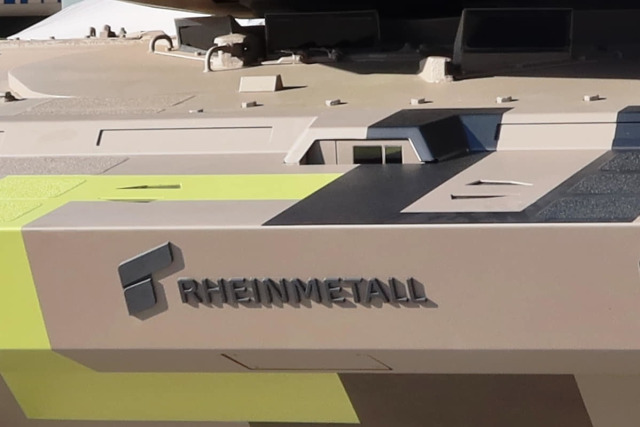
Situational awareness sensors OBT "Panther" KF51Six of these modules are mounted around the turret, front, middle and rear on both sides to cover 360°, providing any crew member with the necessary images, properly adjusted by the video processing unit located at the rear of the turret fighting compartment.
"We also have an application based on artificial intelligence (AI) capable of detecting enemy actions, the open architecture of the system allows us to implement new functions developed by third parties," adds K. Meyer. Since it is not enough just to see around, acoustic sensors for determining the location of the shot and laser warning systems are also built into the tower, allowing to detect enemy fire, as well as to carry out laser rangefinder or illumination.
After processing by special software, all information is combined into a central computer and becomes available to the entire crew, "using a very simple human-machine interface, trying not to overload the capabilities of one crew member," says K. Meyer. He also added that radars should be added to ensure the detection of drones. Presumably, the flat AFAR antennas may well be installed around the tower to provide full coverage of the hemisphere, complementing the visual system of a circular view to determine the location of approaching drones and information exchange between combat vehicles and units. Shot detectors are also sensors that can be integrated to further increase awareness.
All sensors that affect the data for shooting, meteorological, navigation, determining the exact location, taking into account the Coriolis effect, etc., are processed in the fire control computer located at the front left in the tower. It is connected to the gunner's and commander's sights mounted on the right side of the turret.
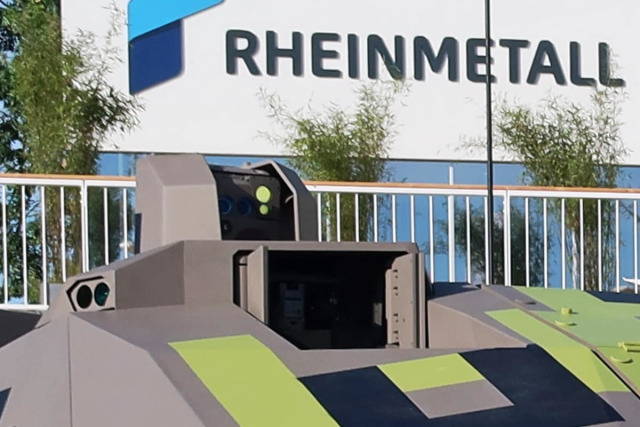
Sights of the commander and gunnerRheinmetall has installed a new fixed digital two-ocular sight for the gunner, while a new commander's sight with a double thermal channel is currently being tested in WTD 81 [a unit of the Bundeswehr military technical service].
The commander's sight includes both MWIR and SWIR sensors, the latter significantly improves visibility in fog.
As for navigation, the Panther KF51 is obviously equipped with GNSS systems, but is also capable of operating in areas where there is no GNSS. Rheinmetall is developing an image-based system. It uses images provided by cameras, compared to digitized map data, to provide accurate positioning that updates the inertial navigation system if satellite signals are jammed or tampered with.
"In our fire control computer, we run a series of programs that minimize the time gap between the sensor and the shooter.Usually, both the gunner and the commander have to constantly monitor the battlefield, one is looking for enemies, identifying them, while the second hits them, working either in the "shooter-shooter" or "hunter-shooter" modes.In the "Panther" KF51, we added pixel modification software that allows us to detect enemies using AI algorithms by putting a tracking symbol on the enemy icon," explains K. Meyer. In the past, pixel change algorithms only worked when the platform was static, but now computing power and AI algorithms allow detecting changes even when the tank is moving, albeit at a reduced speed of about 20 km/h.
All information collected at the platform level enters the combat management System (DBMS), which also receives information from a higher echelon, as well as from other platforms. All this, of course, is supported by a full set of communication tools based on digital radio stations and optimized antennas, and the latter are used not only to connect manned platforms, but also to monitor the actions of UAVs, as well as to maintain a data transmission channel with barrage ammunition (BB).
Rheinmetall Electronics is able to provide the customer with the correct information received from the SUB and transmitted to the mission system, providing it to the crew. Algorithms are also used here to minimize the load on the crew. In Germany, research and development is continuing in order to improve ergonomics and provide data in the best possible way. At the same time, a lot of experience has been accumulated in various export programs in which the company participates.
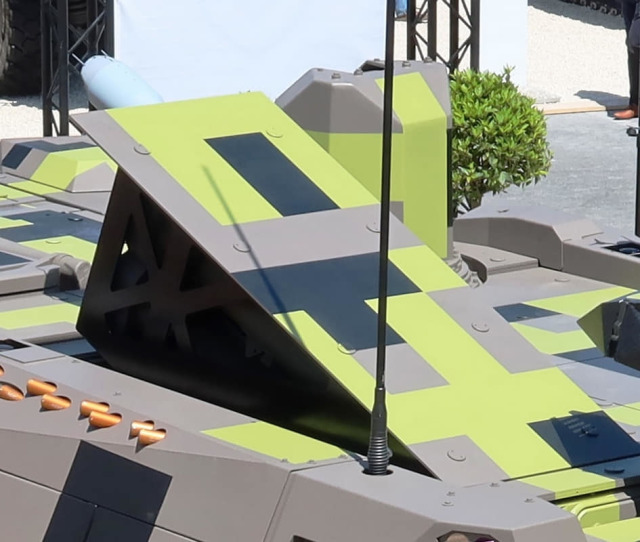
Catapult for UAV or BBBarrage ammunition is multiple.
"Our advanced mission module has a standard interface that allows the use of both UAVs and BB, and is the same size as the anti–tank missile module used in our Lance tower," explains K. Meyer. They should also be equipped with a German army armored personnel carrier with heavy weapons (Schwerer Waffenträger Inanterie) based on the Boxer 8×8 armored personnel carrier, equipped with a turret with a 30 mm cannon and a Spike ATGM.
A certain volume in the rear of the tower of the "Panther" KF51 also allows you to install a short-range UAV. This approach differs from the installation demonstrated on the first prototype at the Eurosatory in Paris, where small VTOL [vertical takeoff and landing] UAVs were located on the side of the tower. They are planned to be fully integrated, and images from them will be transmitted to the crew screens. "The menu will allow you to plan a mission, launch drones and control them, the software is built into the onboard computer system," K. Meyer said.
Regarding the UAV business sector, the Rheinmetall specialist stressed that the company is considering very specific applications, and especially their integration with vehicles, while the company is not aimed at entering the infantry UAV market. At the Eurosatory exhibition, a Panther was presented, equipped with several small quadrocopters, known as a Stinger, located in the outer part of the tower. The MissionPod module, which housed such UAVs, was displayed at the concern's stand, and it was compatible with the missile compartment of the Rheinmetall Lance tower.
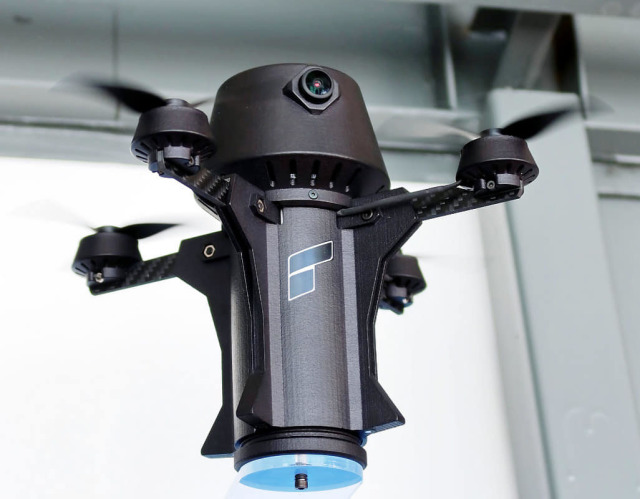
Quadrocopter for MBT "Panther" KF51In addition to the Stingers, there was also a larger reconnaissance quadcopter in the capsule.
While "Stingers" are expendable, launched thanks to a pneumatic system, a larger drone is designed for reuse. He is able to land in a capsule after returning from a mission and recharge the batteries that provide autonomy in 50 minutes. As for the "Stingers", the information provided at the exhibition in Paris spoke about 20-30 minutes of flight, a maximum speed of 90 km / h and 200 grams of payload, possibly a small warhead (warhead). Both devices were developed in cooperation with the Berlin-based company BärDrones.
In Berlin, Rheinmetall confirmed that in cooperation with the German group Israeli uVision, these UAVs will definitely be converted into light ammunition, and the product will become known as HERO-R. The Hero-R barrage ammunition will receive different configurations and sizes. For one of the versions, it is planned to use the Hero-30 warhead weighing 500 gr., therefore, a larger UAV will be required compared to the concept demonstrator presented in Paris.
The MissionPod drone module, which was exhibited at Eurosatory 2022, was developed in accordance with the requirements for integration into the vehicle tower. From the very beginning, it was designed as modular and capable of receiving various UAVs in different numbers depending on their size. This integration technology will also be used in the "Panther" KF51. However, since the available space for integration in each vehicle is different – the MissionPod will also look different. As a result, the exact number of UAVs that can be integrated into each type of vehicle will depend on the available space and the choice of reconnaissance UAVs or BB.
A prototype is being developed that will allow for the take-off and landing of a real-time reconnaissance UAV. The main problems are the small landing surface and the fact that the platform may not be horizontal. A demonstration of the launch and recovery capabilities of the reconnaissance drone is scheduled for the end of 2023.
All sensors, command and control systems, communications, etc. are interconnected thanks to the fully digital standard architecture of NATO vehicles. As Dr. Alexander Kuhrt, vice president for next-generation MBT at Rheinmetall Landsysteme, said: "When we say that Panther has a real open digital architecture, this is not the same message that we gave 10 years ago, because we spent time developing interfaces, hardware, software and electronics, and it's closer to plug-and-play than anything that exists at the moment." He added that this will provide fairly simple support during operation, as well as modernization.
According to Rheinmetall specialists, the initial development of algorithms that can be integrated into the Panther as soon as they are ready continues at their plant in Bremen. These algorithms are mainly aimed at reducing the load on the crew. Although this is not clearly stated, some of them may well be associated with the use of UAVs and drones of the "slave" type. One of the slides showed a sketch of an air defense drone connected to a tank via the combat cloud.
However, the slide was defined as a "conceptual design" that is not included (yet?) The company's portfolio includes exploration, mine clearance, flank protection and other missions that can switch from manned platforms to unmanned ones. Controlling or monitoring these potential robotic assets would be one of the possible tasks of the fourth crew member located in front on the right. He can also be a company commander responsible for coordinating the mission and is not engaged in tank management. On this occasion, Rheinmetall stated that "discussions are continuing with various armies to find out how this additional position fits into their concept of operations."
According to the materials of the resource edrmagazine.eu
